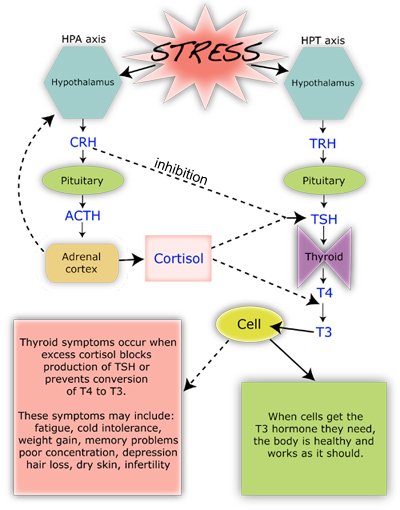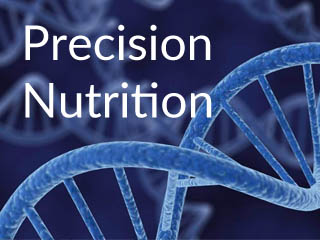 Hypothyroidism is the diagnosis of low, deficient or under-active function of your thyroid. Your thyroid is part of the endocrine system that helps keep hormone and metabolism in balance. Many women experience changes in their thyroid function as they go through life changes. Women are more susceptible to thyroid changes due to the hormone fluctuations during their lifetime. Hormone changes can be a form of stress on the body if the body is not in a place to handle such shifts. You may have read from other articles on this site that many things contribute to stress on the body (toxins, poor genetic signaling, psychological and physical stress, nutrient deficiencies, poor gut health, trauma, etc).
Hypothyroidism is the diagnosis of low, deficient or under-active function of your thyroid. Your thyroid is part of the endocrine system that helps keep hormone and metabolism in balance. Many women experience changes in their thyroid function as they go through life changes. Women are more susceptible to thyroid changes due to the hormone fluctuations during their lifetime. Hormone changes can be a form of stress on the body if the body is not in a place to handle such shifts. You may have read from other articles on this site that many things contribute to stress on the body (toxins, poor genetic signaling, psychological and physical stress, nutrient deficiencies, poor gut health, trauma, etc).
Many women go undiagnosed simply because our healthcare system tends to look at symptoms and organs as if they are separate from everything else. The truth is, every system in the body is connected and influenced by one another. Nutritional deficiencies due to poor gut health and poor intake, poor detoxification ability due to a backed up liver, high cortisol levels due to stress and inflammation…the question is, which came first or are there numerous factors at play? Most likely. This is why functional medicine practices are important because they look at the entire person and all the systems together.
Currently, the healthcare system takes a snap shot at your TSH (thyroid stimulating hormone) levels. This is really a preliminary tool. Some people with hypothyroid can have dysfunction far before TSH levels rise and symptoms prevail. So, how does the thyroid work? The thyroid does this balancing act with three primary hormones...TSH, T4 (thyroxine) and T3 (triiodothyronine). TSH does exactly what it’s name says…it “stimulates” the thyroid. When the thyroid isn’t working properly, the body responds by secreting more TSH to get it working…this leads to abnormally high levels on blood tests. The next question is, where is the problem occurring and why? There may be a problem in the areas of production, conversion and utilization of these hormones.
Here is the pattern: your brain sends a signal to your thyroid to secrete TSH which in turn produces T4 (thyroxine). T4 is then activated in the liver and turned into T3 to be utilized. T3 is the “active” form and is involved in increasing metabolism, development and function of cells, and synthesis of other hormones in your body. The thyroid really is the powerhouse of metabolism and life!
In our healthcare system today, we don’t always look at the underlying issue, but try “shot in the dark” treatments and hope they work. Most practitioners simply supplement with T4, hoping it will covert to enough T3 to do it’s job. It can become tricky because simply supplementing with T4 when the real issue is conversion to T3 can cause even more imbalance and disruption. If you are on T4 only medication, it is extremely important to check both T3 and T4 ratio’s, and even better to check Free T3 and Free T4. And remember, nutrients play a vital role in synthesis, conversion and utilization.
How does stress contribute to imbalanc? Stress raises cortisol levels that actually block secretion of TSH or the conversion of T4 to T3. Another issue that can arise is autoimmune disease where your body sends inflammatory signals and triggers your immune function to “attack” the thyroid as if it were a foreign invader. This can many times stem from immune imbalances triggered by stressors especially related to gut health. A leaky gut along with a backed up liver can exacerbate autoimmunity. There are multiple factors that contribute to immune dysfunction.
Imbalances in estrogen, progesterone, and testosterone can also effect thyroid, so don’t forget to test for these ratios. A simple estrogen test will NOT be enough because you can appear to have “normal” estrogen levels but very low progesterone. This means you have estrogen dominance and are at greater risk for disease and hypothyroidism. One must wonder which came first…the sex hormone imbalance or the thyroid and what contributed to their imbalance? One may need to look at correcting one before the other, or both at the same time. A full history dating back to menstruation at puberty, the use of hormones, and/ or toxic exposure can be enlightening.
Many woman who experience thyroid dysfunction can correct it with nutrition therapy, lifestyle changes and supportive supplements. Others may have progressed to the point where hormone therapy is needed. The most common prescribed medications are synthetic (made in a lab) and concentrate on T4 only. If you are taking this type of medication, it is important that you follow up more frequently to make sure you are in balance. If you suffer from estrogen dominance, there is also herbal and nutritional therapy that can help correct and manage the imbalance. Hypothyroid can be a very tricky issue and leave women feeling frustrated, tired, and make weight loss difficult. A functional practitioner will take the time to look at you as a whole person and take the time to help manage and correct your underlying issues. Restore your body, seek natural therapies first!
Ask me about comprehensive nutrient analysis testing by Dr. Keith Zimmermann. Metagenics products are available for hormone balance and support.




 Providing nutritional therapy and lifestyle education for disease prevention and weight management....
Providing nutritional therapy and lifestyle education for disease prevention and weight management....